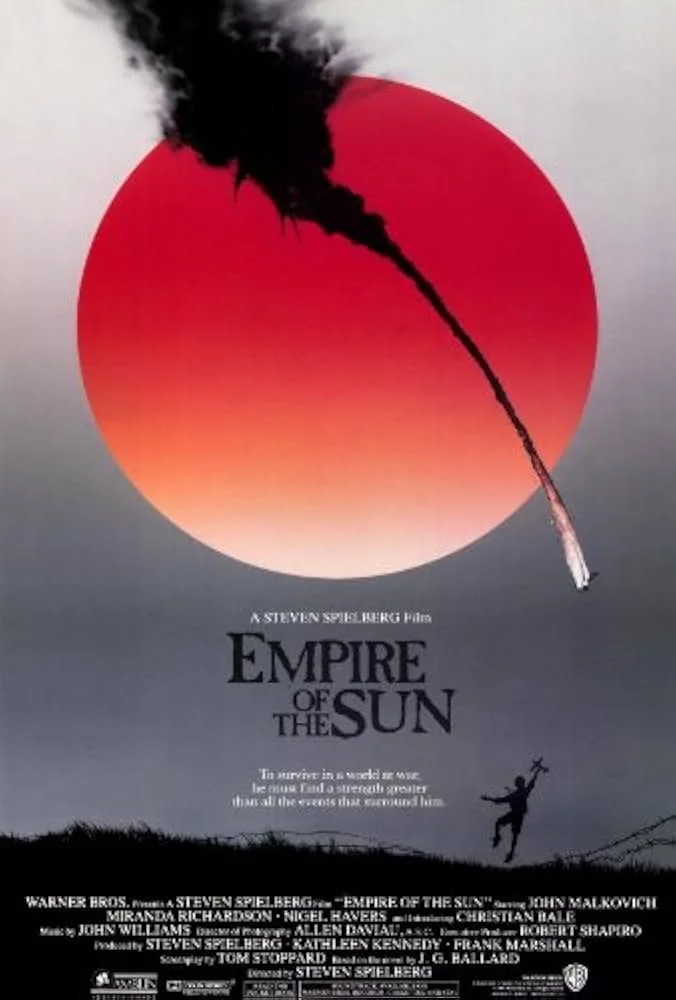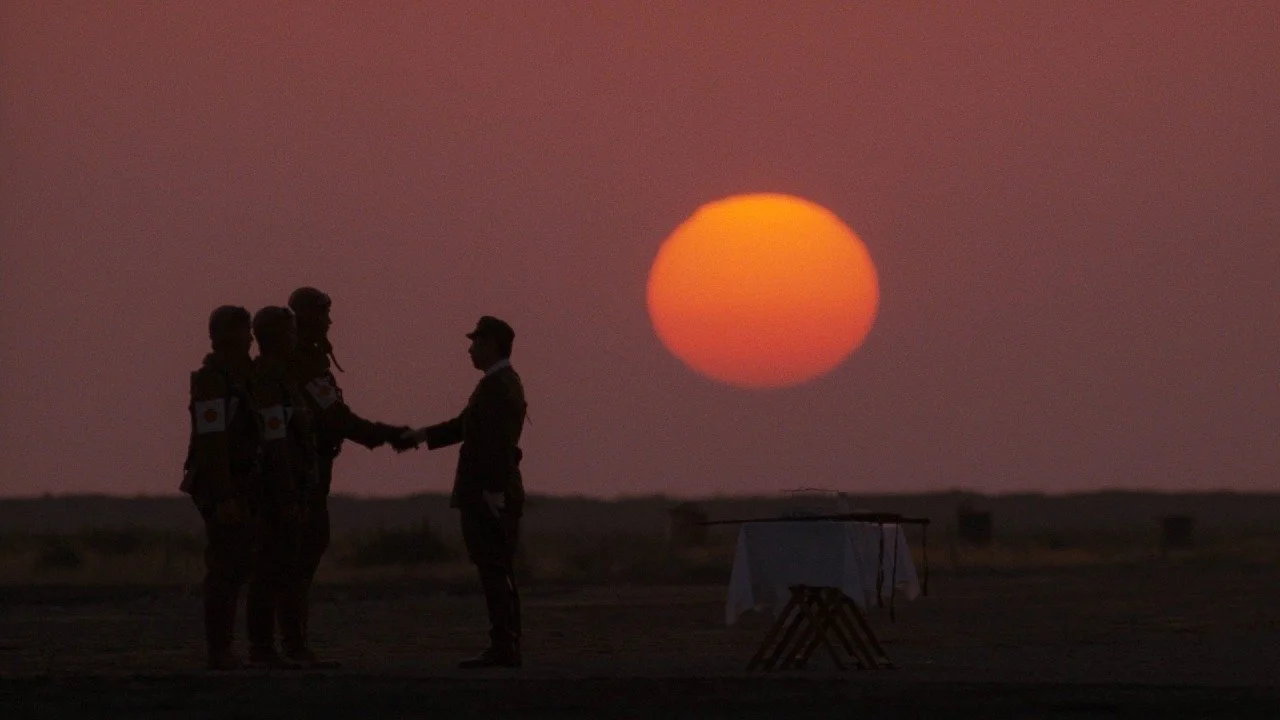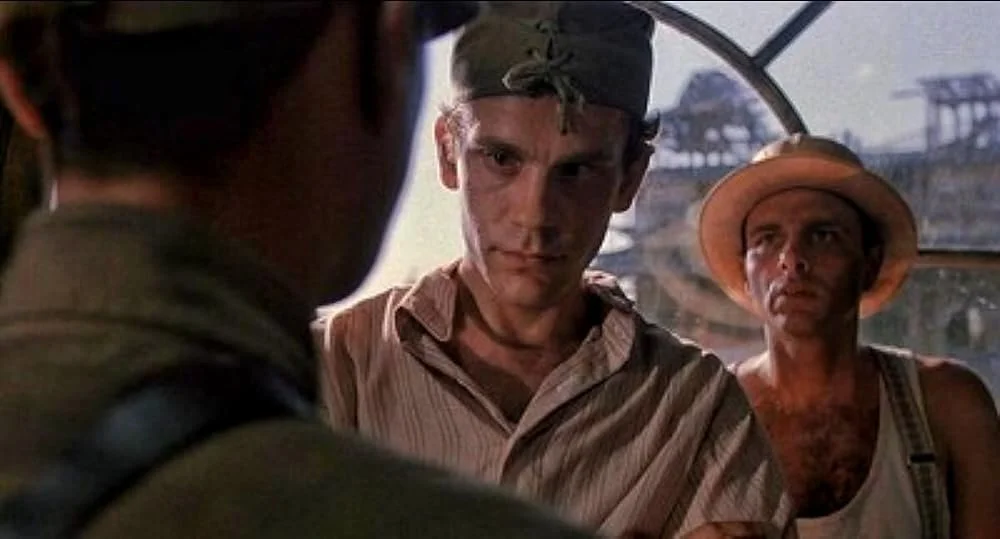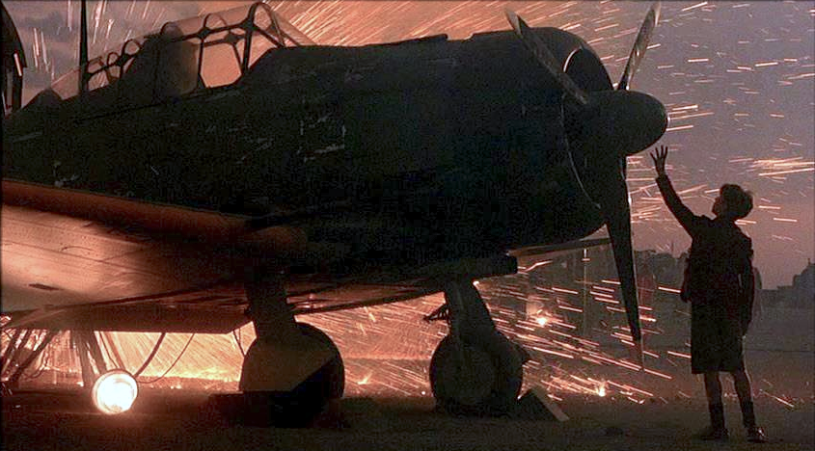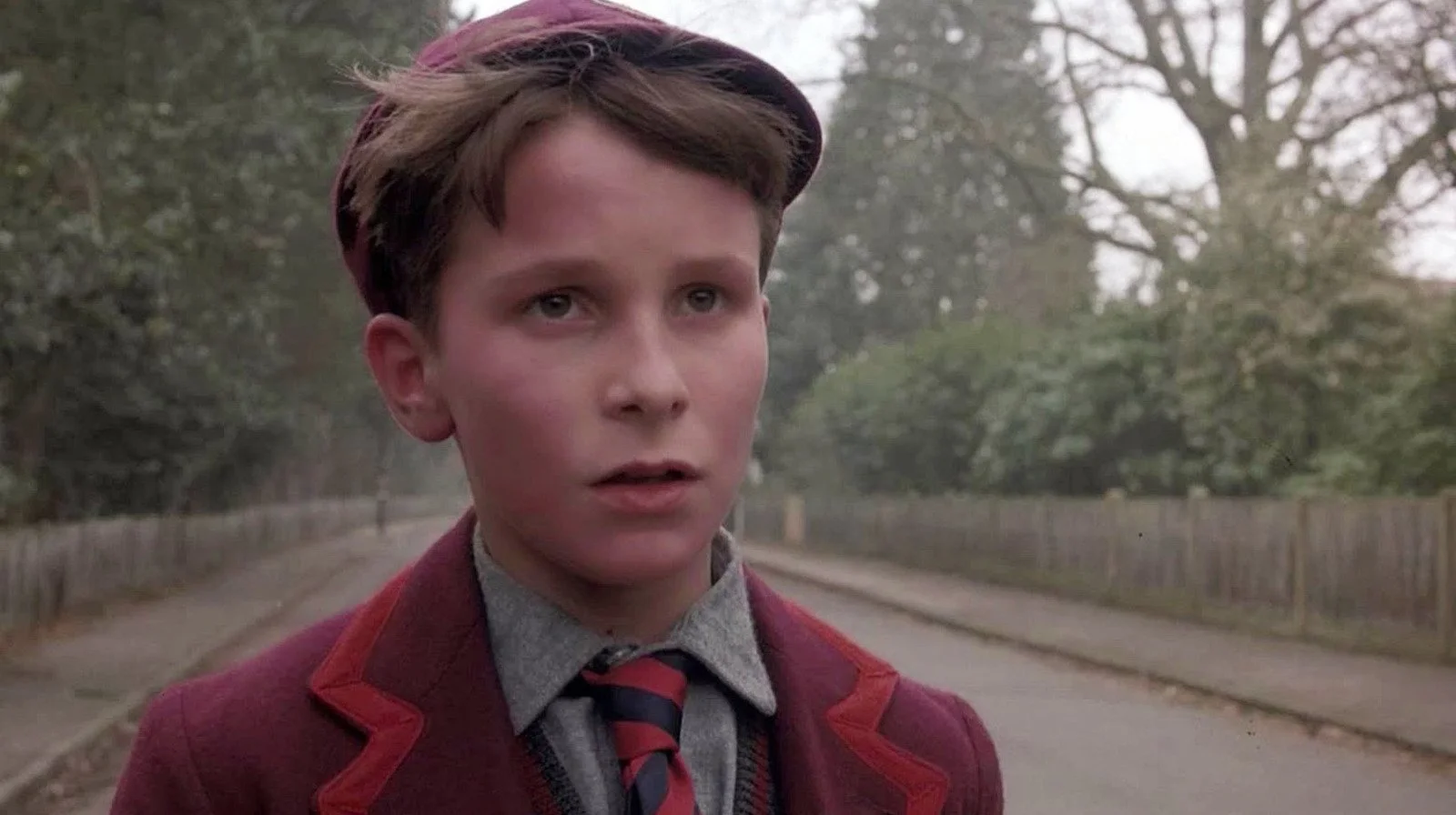Steven Comes of Age With EMPIRE OF THE SUN: Spielberg Summer 2 Continues
For most people, childhood is a silo.
An adult raising a child has many jobs, but one of the most important ones that come up over and over again is the protection from the harsh reality of the world surrounding them. I was a 90’s kid, growing up in a decade that is being looked back on lately with rose-colored glasses by essentially every single person my age. This is in spite of several turbulent events: the Columbine school shooting, the killing of Matthew Shepard, the impeachment of the President of the United States, the tumultuous murder trial of a famous football player, riots in Los Angeles, the bombing of a federal building…and that’s just keeping the focus on things stateside.
But I didn’t really care, and truly barely knew, about any of it at the time. I was too busy reading Calvin & Hobbes and watching Animaniacs and drawing shitty pictures, as a child is supposed to do. Pretty much all of my peers were. We had our own internal battles to fight, to be sure, but we were siloed from the horrors of the outside world, even in a (relatively) stable era.
Of course, that loss of innocence, that “coming-of-age” moment, when the silo breaks and the outside world finally leaks in, that moment arrives and you’ve now been altered forever (for most of us, that was probably September 11th, 2001). Unless you’re overwhelmingly lucky, it’s a period of life that is usually inevitable, and it’s ultimately a necessary one. Coming to terms with the fact that the world can be arbitrarily cruel, that sometimes people just suffer, that your parents aren’t always going to be there to help you swim through the murky waters of the chaos….it’s painful, but it’s needed.
Those types of moments in life tend to form the backbone of most Steven Spielberg movies; it’s no accident they often feature kids separated from their parents. The universality of those periods of life allows it to be applied to just about any kind of setting: 1930’s Cairo, 70’s Middle America, the far distant future, a theme park filled with dinosaurs…this period makes any imaginable world instantly recognizable, because we all go through it.
Of course, because of this, the exploration of this crucial chapter in everyone’s life served Spielberg well when he returned to the historical time period that captivated him as a young lad, barreling towards his own silo-bursting: World War II.
EMPIRE OF THE SUN (1987)
Directed by: Steven Spielberg
Starring: Christian Bale, John Malkovich, Miranda Richardson, Joe Pantoliano
Written by: Tom Stoppard
Released: December 11, 1987
Length: 154 minutes
EMPIRE OF THE SUN tells the story of Jamie Graham (Bale), a British schoolboy living a very posh, and extremely privileged life within the Shanghai International Settlement in the early 1940’s. This cushy existence is maintained even as World War II rages on in the background, and Japan continues to ratchet up its invasion into China. The bubble gets forever burst once Japan attacks Pearl Harbor and the Pacific War officially begins. As people begin to evacuate, Jamie is separated from his parents and this upper-crust kid is now left to figure out how to navigate an uncertain world on his own. As the movie goes along, and Jamie finds a kind of bespoke father figure in a thief known as Basie (Malkovich), the question becomes: what kind of man will Jamie be?
The first thing about this I wanted to mention: my knowledge of history is weak enough that I always love it when a movie teaches me about something that I ought to have known about already. I had no idea about the Shanghai International Settlement, nor that it existed for as long as it did (first established in 1863!). Whenever something from world history gets depicted in a major film, I automatically assume that everybody else just already knew about it. However, if you didn’t know about this particular piece of it…well, hey, you oughta check out EMPIRE OF THE SUN!
The second thing to mention: EMPIRE OF THE SUN was initially conceived as a possible David Lean picture! Yes, after original choice Harold Becker dropped out of the project, Lean was brought in to adapt the J.G. Ballard novel, with Spielberg producing. However, Lean just never developed a connection to the material, and he eventually passed the project along to Spielberg, who secretly wanted to direct it all along. And, look, you can definitely see a lot of Lean in this visually (and that’s probably no accident; Spielberg is an avowed fan, citing BRIDGE ON THE RIVER KWAI as one of his favorites of all time). At the end of the day, though, EMPIRE OF THE SUN is unmistakenly a Spielberg movie. We’ve got lost children, found fathers, World War II, a reverence for aviation, swelling music…you couldn’t miss his fingerprints on this picture if you tried. E.T. was definitely his “divorce movie” up to this point, but you can’t help but feel like he heavily reflected on the separation of his parents when reading the novel.
These Spielbergian hallmarks also help make EMPIRE OF THE SUN feel kind of comfortable in its own little way, at least in the way it communicates its story and themes. The set up for Jamie Graham, the character in which we view the entirety of the film’s events, is particularly satisfying. As mentioned, he’s a boy who’s been placed inside a bubble, both functionally and metaphorically, by virtue of living within the confines of the Shanghai settlements. To him, the biggest issue he faces is whether the maid will allow him to have his favorite buttered biscuits before bed or not. He lives wrapped up completely in a cloak of privilege he (understandably) has no awareness of*. This is exemplified perfectly by the Graham family’s early trip to a lavish party across the city. The commute to the party leads them through a chaotic and overcrowded Shanghai street. Pressed faces, hustling children, bloody food wares streak across the passenger side window. They’re right there, right in Jamie’s face, yet cannot touch them. He can observe them, but he’s not affected by them.
*Although not from lack of trying by his parents. His dad reminds Jamie in the beginning, who becomes fixated on a homeless guy right behind their wall that they have more luck than most, and the homeless guy still has more luck than some. It’s a nice moment of humanity from a character that could have been really nasty.
EMPIRE OF THE SUN continues the exploration of the role of a father that THE COLOR PURPLE began. Once Jamie is separated from his actual dad, the movie involves Jamie trying to find new parental figures to latch onto, and boy, does he find a complicated one in Basie. He’s a transient sailor, a thief and an opportunist in every sense of the word. Although Basie is comfortable having Jamie tag along once they happen to cross paths (via his compatriot Frank, played by Joe Pantoliano), he also makes it very clear through his actions that he will bail on this orphaned kid if he feels like he needs to. Hell, on the first day they meet, Basie gives a good try to sell Jamie off to some strangers. This makes for an interesting turn when the two of them (plus Frank) end up rounded up by the Japanese, into a holding center, officially hostages of a foreign government.
In the hands of Malkovich, Basie becomes a great piece of the thematic bricks that EMPIRE is built off of. He’s the type of adult you tend to meet over and over again once your world expands beyond the confines of your own home. As it turns out, many human beings end up existing for themselves, even when they turn out to have something of value to teach another person. Jamie does pick up some legitimate street smarts from the guy, which is invaluable for his survival (and, in some cases, even thriving) in the camps. However, this sort of mentorship doesn’t actually translate into any sort of love. In one of the more heart-breaking moments of EMPIRE OF THE SUN, Basie gets selected by the Japanese to be transferred from the holding center to an official camp. Despite his loud pleas to be brought along, Basie puts his head down as he climbs into the truck and pretends not to notice. The Tom Stoppard-penned script can’t help but twist the knife here: Jamie ends up also getting chosen to be transferred, and they both have to sit there in that truck, knowing how Basie really feels.
That is the purpose of a “coming-of-age” story, though, that change from a child to something resembling an adult, and there’s no more profound moment in life than realizing that, oftentimes, you’re on your own. So it goes for Jamie: the only reason he gets chosen for transfer is by annoying his way onto the truck, pestering the driver into letting him give more appropriate directions to where they’re headed. In a moment of crisis, he’s now proven to be self-reliant. Perhaps he’s grown beyond Basie entirely.
I should point out here that, yes, EMPIRE OF THE SUN details a very harrowing and grueling story, involving a lost child forced to grow up in the crucible of government occupation and captivity. But Spielberg’s direction does keep things from feeling too heavy, often to the film’s benefit. There is a fair amount of whimsy throughout, best exemplified by a scene halfway through (in some ways, it feels like an Act One finale). Something that we know about Jamie consistently throughout the story is his obsession with the act of flight and the craft of an airplane (another way the director is undoubtedly infusing himself into this tale). An early moment involves him sitting in the cockpit of a long-since-wrecked plane, imagining himself as the hero of one of his beloved magazines. At one point during his tenure in the Japanese holding cell, however, he stumbles across a team of pilots fixing up a fleet of fighter jets. The sparks of the soldering irons feel something like fireworks, as Jamie becomes captivated, seeing an airplane in person for the first time. Although he gets yelled at by a general to get back, the pilots seem a little more amenable; as Jamie salutes in reverence, and the John Williams score swells*, they salute back. As it turns out, nothing can bring two enemies together like a shared love and interest.
*You’ll never believe it, but John Williams did the score to this Steven Spielberg movie.
Yes, I know that Spielberg’s handling of darker materials at this stage of his career is something that has been questioned, but I maintain that moments like this work really well, possibly because it’s a story being told from the perspective of a twelve-year old, as opposed to an adult. That said, Spielberg does, alas, push the whimsy just a tad too far at places. There’s a moment in EMPIRE OF THE SUN that, had it been written as a vicious Spielberg parody, would have had not a single syllable altered. Late in the film, Jamie watches as an ailing fellow prisoner, Mrs. Victor (Richardson), passes away in the middle of the desert. As she dies, we suddenly see the fallout of the Nagasaki bombing off in the distance. Jamie, in his childlike innocence, believes the fallout to be Mrs. Victor’s soul flying away to heaven. Woof.
Still, the film gets away with these saccharine moments, because the performance at its center is so good. Take it from me: I am a fairly avowed Christian Bale skeptic. He’s not the most irritating actor on my enemy list; he actually has a handful of adult performances that I think are pretty good (I think the “Batman voice” meme has overshadowed just how strong his Bruce Wayne is in the Nolan DARK KNIGHT trilogy!). However, he’s one of those guys who has a whole “method acting” hype machine behind me that makes any potential criticism of his work instantly invalid in the eyes of many a fan, in both online and real life spaces. “How can you say Christian Bale isn’t a great actor? Didn’t you see how much weight he lost for THE MACHINIST?” “How can you say he’s overrated? Don’t you know how seriously he takes his roles, even in shit like TERMINATOR 4?” Cool! Good for him! I never realized that acting could be quantified by the amount of interesting behind-the-scenes facts you can regurgitate about someone*. Here I thought I was just alienated by most of his work. I’ve seen the light!
*You absolutely do not want to start the Daniel Day-Lewis conversation with me here.
ANYWAY, that said, imagine my surprise when I found his lead performance here, at the age of 13, to be easily the best thing I’ve ever seen him do. Jamie is an enormous role that requires a lot of emotional range, coupled with the normal pitfalls that come with hinging the success of your entire film on the shoulders of a child. In this sense, Bale is great. In the beginning, he’s entitled without being annoying. By the end, he’s confident without being precocious. He has a remarkable amount of self-control, considering, again, he’s a teenager. I truly, truly kept waiting for him to piss me off. It never happened. One can only imagine what his performance would have been like if he had known to gain thirty pounds first.
Putting EMPIRE OF THE SUN in context with his complete filmography, it becomes clear why it’s become the ultimate “underseen and underrated” Spielberg film. Despite its relative high quality, it’s flanked by too many all-time Hollywood classics: RAIDERS OF THE LOST ARK. E.T. THE EXTRA-TERRESTIAL. The one-two punch of SCHINDLER’S LIST and JURASSIC PARK a few years later. It just never hit the zeitgeist the way many other Spielberg movies did. Although it earned six Oscar nominations, they were all in technical categories, and resulted in zero wins. EMPIRE OF THE SUN probably just got overshadowed by another big historical epic from a legendary director that year: Bertolucci’s THE LAST EMPEROR. Hell, even the name is pretty similar.
It’s also not one of his very best. But I do think, were you to watch it, it would become an easy answer for you the next time someone asks you for a film recommendation. If nothing else, it makes you reflect on the way we ultimately have to navigate a sometimes-scary world, how to navigate trusting another person, how to grow into yourself, how to connect with the things you love, even when gatekept by an enemy.
Oh, and a young Ben Stiller somehow appears in this very briefly. That definitely makes for a fun fact at a trivia night, if nothing else.
